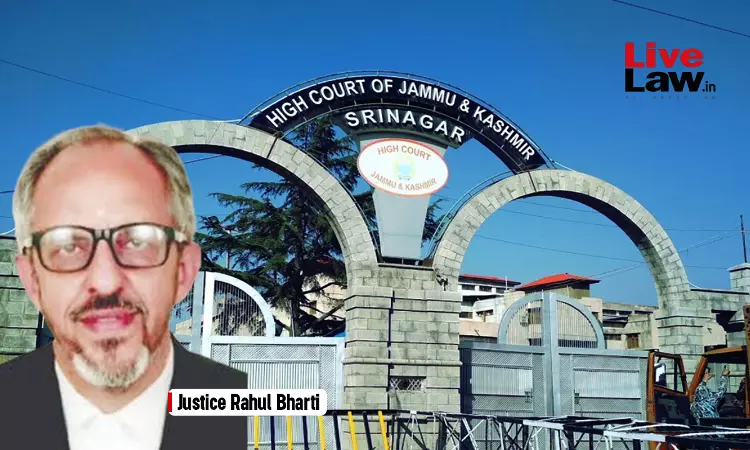- Home
- /
- High Courts
- /
- High Court of J & K and Ladakh
- /
- Findings Of Fact Not Conjecture,...
Findings Of Fact Not Conjecture, Evidence Act Governs Civil Cases As Much As It Does Criminal Trials: J&K High Court
LIVELAW NEWS NETWORK
17 May 2025 2:30 PM IST
Underscoring the sanctity of judicial procedure and evidentiary rigour, the High Court of Jammu & Kashmir and Ladakh has set aside conflicting judgments passed by the trial and appellate courts, declaring that "finding of fact is something which is not to be conjectured by civil court or for that matter civil 1st appellate court."Justice Rahul Bharti, while deciding a second appeal held...
Underscoring the sanctity of judicial procedure and evidentiary rigour, the High Court of Jammu & Kashmir and Ladakh has set aside conflicting judgments passed by the trial and appellate courts, declaring that "finding of fact is something which is not to be conjectured by civil court or for that matter civil 1st appellate court."
Justice Rahul Bharti, while deciding a second appeal held that the Evidence Act governs civil adjudication just as much as it does criminal trials, and both courts below had acted without adhering to fundamental procedural requirements.
Background of the Case:
These observations came in a dispute originating from a civil suit filed by four brothers, residents of Rajouri district. They sought a permanent prohibitory injunction to restrain seven defendants from interfering with their possession of land. The suit was based solely on an oral claim of possession.
The defendants responded with a denial of the plaintiffs' possession and claimed to be in long-standing possession themselves. This led the trial court to frame issues. Crucially, both parties failed to present official records or revenue officials as witnesses. The plaintiffs did not depose themselves nor bring any formal documentary evidence, relying instead on two non-official witnesses. The defendants followed suit, also producing only two non-official witnesses and avoiding self-examination.
Despite the absence of formal evidence, the trial court decreed the suit in favour of the plaintiffs restraining the defendants from interfering with the suit land. The defendants appealed before the Principal District Judge, Rajouri, who reversed the trial court's findings and dismissed the suit. The appellate court concluded that the plaintiffs were not in possession and, hence, there was no interference by the defendants.
Aggrieved by this reversal, the plaintiffs filed the second appeal before the High Court.
High Court's Scathing Observations:
Justice Rahul Bharti delivered a sharp critique of the manner in which both the trial court and the first appellate court handled the case. He observed that both courts had acted “as if novice in understanding of law,” issuing contradictory findings of fact without any evidentiary foundation.
The absence of documentary evidence, revenue records, or testimony from either party meant that the trial was conducted in complete disregard of the Evidence Act, the bench stated.
“The plaintiffs did not examine themselves as their own witnesses... Likewise, the defendants also did not examine themselves... Still, the trial court as well as the first appellate court came up with opposite findings of fact,” the Court noted, calling such adjudication an antithesis to the law of adjudication of a civil suit.
“.. the trial court as well as the civil 1st appellate court acted as if sitting as panchayats and disposing of the matters at their respective ends as per their respective discretion which is antithesis to the law of adjudication of a civil suit which is supposed to take place in accordance with the Code of Civil Procedure and the Evidence Act”, the court remarked.
Finding serious lapses in trial procedure and legal reasoning, the High Court allowed the second appeal and set aside both the trial court's decree and the first appellate court's judgment. The matter was remanded to the court of Munsiff (Additional Special Mobile Magistrate), Thannamandi, to be taken up afresh from the stage of framing of issues.
Case Title: Mohammad Tufail Vs Muzaffar Hussain
Citation: 2025 LiveLaw (JKL) 192



